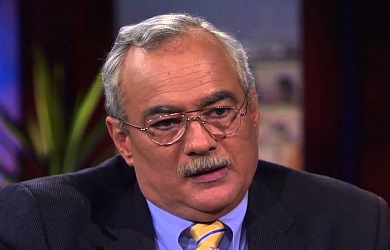Last year, University of Texas professor Mark Regnerus — author of a widely panned study on same-sex parenting that is nonetheless frequently cited on the Religious Right — helped launch a new group called the Austin Institute for the Study of Family and Culture, which has since been publishing his research on topics including pre-marital sex, divorce, religion among college students and masturbation.
According to tax records filed this summer, the Austin Institute receives much of its funding from one donor: New York hedge fund honcho and social conservative mega-donor Sean Fieler.
The 2013 tax return for Fieler’s Chiaroscuro Foundation reports two grants to the Austin Institute, totaling $250,000. Although the public copy of Chiaroscuro’s tax return obscures the dates of its fiscal year, the organization’s 2010 return indicates that its tax year runs from January through December.
Meanwhile, the Austin Institute’s return reports that it took in just $205,000 in contributions between February and June 2013, indicating that a significant portion of its initial funding came from Fieler’s charity.
Fieler’s funding of the Austin Institute shouldn’t come as a surprise. To begin with, he is a trustee of the Witherspoon Institute, the Princeton-based think tank that kicked in $700,000 for Regnerus’ now infamous “New Family Structures” study. The study claimed to show that children raised by gay and lesbian parents suffer all sorts of harmful consequences like drug use and abuse, despite only actually studying two people raised by same-sex couples.
According to the Austin Chronicle, the new group was quickly dubbed “Witherspoon Institute South” — a name stemming from its staff’s plentiful ties to the Witherspoon Institute and the Religious Right.
The Austin Institute grants were among the biggest expenditures last year by Fielder’s Chiaroscuro Foundation, many of which went to groups fighting marriage equality and abortion rights. This year, recipients include Americans United for Life ($20,000), the Becket Fund for Religious Liberty ($260,000), the Catholic Family and Human Rights Institute (C-FAM), which fights pro-choice and LGBT rights initiatives at the U.N. ($20,000), the National Abstinence Education Foundation ($50,000) and the Susan B. Anthony List ($40,000). As ThinkProgress noted yesterday, Fieler’s foundation also gave $50,000 last year to Morality in Media for its increasingly quixotic anti-porn campaign.
In 2012, the foundation gave $20,000 to the National Organization for Marriage, but seems to have snubbed the group in 2013.
The Chiaroscuro Foundation is just the beginning of Fieler’s influence: Last month, RH Reality Check delved in detail into Fieler’s political spending, including his funding of the American Principles Project and his hand in political races across the country.
While Regnerus’ research at the Austin Institute has so far made less of a splash than his faulty same-sex parenting study, he has continued to lend his voice to the effort to stop marriage equality, including testifying on behalf of a same-sex marriage ban in Michigan this year. (That move caused some of his UT colleagues to distance themselves from his work.)
The Austin Institute’s most noticeable contribution so far is a viral YouTube video applying a pop-economics veneer to the Religious Right’s favorite target, the sexual revolution. The video explains (in economic terms, of course) how contraception led to women turning against each other while men became video-game playing slobs — the only solution to which is for women to band together to withhold sex until marriage.
And the Austin Institute seems primed to provide more research to conveniently reinforce the Religious Right’s policy views — a solid investment for a donor like Fieler.
UPDATE: A reader points out that the Bradley Foundation, a conservative group that includes the Witherspoon Institute’s Robert George on its board and that also helped to fund Regnerus’ “New Family Structures” study, also reported a $100,000 grant to the Austin Institute last year.







